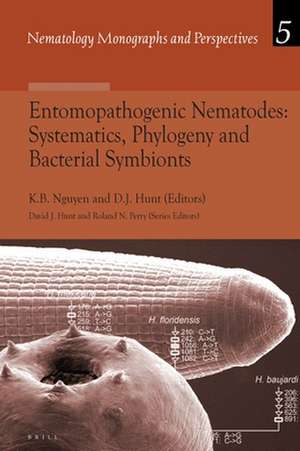Entomopathogenic Nematodes: Systematics, Phylogeny and Bacterial Symbionts: Nematology Monographs and Perspectives, cartea 5
Autor Khuong Nguyen, David Hunten Limba Engleză Paperback – 29 sep 2007
In the first part, history, taxonomic status, family and genus definitions of EPN are mentioned. In the second part, all useful aspects of morphology and methodology of EPN are mentioned with illustrations and SEM photographs and instructions on how to make the measurements, and how to use them in taxonomic work. A polychotomous key with SEM photographs and illustrations is provided. In the third part, full descriptions of all species are presented with latest information about each species. In the fourth part, molecular and phylogenetic methods for working with EPN are presented, including the latest information and instructions on how to use molecular data in taxonomic work. In the last part, bacteria associated with this group of nematodes are discussed in the context of the latest information about methodology, biology and taxon.
Preț: 1146.02 lei
Preț vechi: 1397.59 lei
-18% Nou
Puncte Express: 1719
Preț estimativ în valută:
219.32€ • 238.15$ • 184.23£
219.32€ • 238.15$ • 184.23£
Carte indisponibilă temporar
Doresc să fiu notificat când acest titlu va fi disponibil:
Se trimite...
Preluare comenzi: 021 569.72.76
Specificații
ISBN-13: 9789004152939
ISBN-10: 9004152938
Pagini: 816
Dimensiuni: 155 x 235 x 31 mm
Greutate: 1.42 kg
Editura: Brill
Colecția Brill
Seria Nematology Monographs and Perspectives
ISBN-10: 9004152938
Pagini: 816
Dimensiuni: 155 x 235 x 31 mm
Greutate: 1.42 kg
Editura: Brill
Colecția Brill
Seria Nematology Monographs and Perspectives
Public țintă
Those interested in Nematology, Entomology, Zoology, Insect parasitology, Plant protection, Extension, molecular taxonomy, classical taxonomy.Notă biografică
Khuong B. Nguyen, Ph.D. (1988) in Nematology, University of Florida, is a senior biological scientist at the University of Florida.
He has published extensively in Taxonomy of insect parasitic nematodes. He has described 15 species and one genus of nematodes.
David J. Hunt, Ph.D. (1975) in Nematology, University of Reading, is a senior nematologist/biosystematist at CABI Europe-UK, a post he has held for over 30 years. He is Editor-in-Chief of Nematology and has published extensively on the taxonomy of plant-parasitic and arthropod-parasitic nematodes, describing over 100 new species and 17 new genera.
He has published extensively in Taxonomy of insect parasitic nematodes. He has described 15 species and one genus of nematodes.
David J. Hunt, Ph.D. (1975) in Nematology, University of Reading, is a senior nematologist/biosystematist at CABI Europe-UK, a post he has held for over 30 years. He is Editor-in-Chief of Nematology and has published extensively on the taxonomy of plant-parasitic and arthropod-parasitic nematodes, describing over 100 new species and 17 new genera.
Recenzii
"This book is a must-have for al those who want to describe new species of either Steinernema or Heterorhabditis. [...] The book provides monumental information to help identify these entomopathogenic nematodes and use them as biocontrol agents"
M. Rafiq Siddiqi, International Journal of Nematology (December 2007, vol 17 no. 2)
"The publication of this book is an event that will send very positive stimuli across this specific field
of zoology - EPN studies... This book will influence studies of entomopathogenic nematodes for years ahead. [Above all] it will make life easier for anyone intending to describe new EPN pecies or to isolate associated bacteria, and to use molecular techniques to study their phylogenetic links."
Sergei Spiridinov, Russian Journal of Nematology, vol 16 (2008) pp. 67
M. Rafiq Siddiqi, International Journal of Nematology (December 2007, vol 17 no. 2)
"The publication of this book is an event that will send very positive stimuli across this specific field
of zoology - EPN studies... This book will influence studies of entomopathogenic nematodes for years ahead. [Above all] it will make life easier for anyone intending to describe new EPN pecies or to isolate associated bacteria, and to use molecular techniques to study their phylogenetic links."
Sergei Spiridinov, Russian Journal of Nematology, vol 16 (2008) pp. 67










